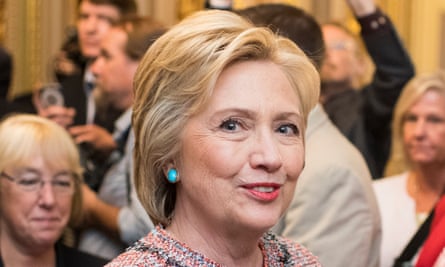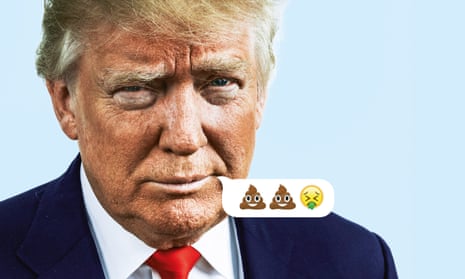When Hillary Rodham Clinton became the first woman in American history to clinch a major party’s presidential nomination, her rival responded with all his customary grace.
“Obama just endorsed Crooked Hillary. He wants four more years of Obama – but nobody else does!” Donald Trump sneered on Twitter.
But for once, it was Clinton’s riposte back in June which went viral. “Delete your account,” she retorted in what became her most widely shared tweet ever, partly because these three words are a well-known internet meme broadly translatable as “You are so laughably dumb you should disappear from the face of the earth.” (Imagine Theresa May responding to Boris Johnson crashing out of the leadership race with some sassy emojis and a car crash gif, and you’re halfway there.) But it’s also because that was the moment political Twitter beefs – aggressively personal slanging matches between rivals on social media – went mainstream. And that has implications for the political culture surrounding us all.
Nobody cares about smart alecks trading insults in an empty room, of course, and to anyone who doesn’t use Twitter – most Britons – it doubtless looks fairly empty. But then nobody really cared back in the 80s when Ronald Reagan’s speechwriters first responded to commercial pressures on American broadcasters by peppering his scripts with simple, punchy clips a few seconds long. Nobody cared much when, a few years later, rolling 24-hour news took off in Britain. And by the time we’d woken up to the way sound bites plus a newly voracious news cycle that had changed both political debate and the nature of who prospers in it – well, it was too late. You may not care about social media now, but if you read a newspaper, listen to the radio or watch TV, then it’s shaping your world already.

“Twitter can set the agenda for what journalists are covering – just think about the ways Trump’s tweets have, over the course of the past six months, set the agenda,” says John Parmelee, author of Politics and the Twitter Revolution. “Twitter’s basically used by politicians to influence other influencers. It’s a very small universe of people, but it’s people who can move an agenda. It’s like the practice of lobbying – people might say, ‘How can that be effective when you’re talking to such a small group of people?’ But they’re the group that’s making legislation.”
Suburban moms in Ohio won’t suddenly switch to Hillary because she said something witty on a platform they don’t use, but then that’s not the point. The real game is hardening your own support in ways dramatic enough to be picked up by the mass media – and as surely as a few cross words between Taylor Swift and almost every other celebrity on Twitter guarantees endless free album publicity, the easiest way of doing that is to pick a rollicking fight.
To some politicians that already comes as naturally as breathing. One unexpected highlight of the Brexit debate was the gleeful explosion on to the Twitter scene of the 68-year-old Tory MP and staunch pro-European Sir Nicholas Soames. His feed is an idiosyncratic mix of pictures of labradors and game birds interspersed with sweary exchanges of fire. (One characteristic instruction to the ITV political editor Robert Peston to “get a haircut, put a tie on and generally smarten up” elicited a succinct “Errr. Eff off”; an encounter with supporters of Julian Assange ended with Churchill’s grandson thundering that Assange was a “scoundrel liar coward bail fugitive and common criminal”.)
Trivia, perhaps, but it has revived Soames’s career – suddenly the TV studios are chasing him again – and allowed a new generation with no idea who he was to discover him all over again. He gets away with breathtaking rudeness because he’s funny, with a diarist’s natural talent for making the “dreadful cad” Nigel Farage or the earnest Eurosceptic Bill Cash unite a divided room “in passionate desire for Sir W Cash to sit down and cease boring on” come alive in 140 characters. But not all virtual beefs are such a laughing matter.

One morning early in July, after it became clear that Owen Smith hoped to challenge Jeremy Corbyn for the Labour leadership but before most Labour voters had any real idea who he was, Smith set out his position in a brief series of tweets.
He had, he said, asked Corbyn three times if the latter was prepared to see the party split in order to cling to power, but received no answer, adding that “in the same meeting, in response to the same question @JohnMcDonnellMP shrugged his shoulders and said ‘if that’s what it takes.’”
It was a provocative thing to say publicly, particularly since it used McDonnell’s Twitter handle – an aggressive move in Twitter etiquette, bringing whatever you say about someone to their attention. Sure enough the shadow chancellor bit back, calling the story “complete rubbish”. At which point Smith’s colleague Kate Green chipped in: “I was at that meeting John. I heard you say it. Are you now backtracking?”
What’s striking is that arguments like that would once have been held only within a very tightly closed circle. The contents might well have been leaked off the record to journalists or alluded to in coded fashion in think pieces for Labour inhouse journals. But now the drama unfolds in plain sight, raw and unfiltered, beneath the noses of a popcorn-munching audience.
It’s a sign, perhaps, of just how estranged the two camps in Labour have become; after all, you don’t brawl in public unless private relationships have almost completely broken down. “Labour MPs are decreasingly talking to each other in the tearooms,” observes a veteran former party aide. “People find it much easier to tweet something at someone if they don’t have to see them the next day.”
But for Ayesha Hazarika, former speechwriter to Ed Miliband, the airing of dirty laundry also reflects the way Labour MPs have come to rely on Twitter as a liberal space for debate. “It was such a Labour thing. We got used to carrying out our family business on it – if you had a thought on anything, you’d splurge it on Twitter. We’ve simply got used to playing out our psychodramas there.” Like a married couple fighting at a dinner party, deaf to all embarrassed attempts to change the subject, they seem almost past caring who’s listening.

And that’s what differentiates Labour’s new Twitter wars from what’s unfolding in America. The chilling thing about Trump isn’t just the casual racism and sexism, the breathtaking indifference to whatever is stirred up. It’s the niggling worry that he’s lighting fires under American life not because he can’t stop himself, but as a coldly calculated means to an end. Lacking an established political machine behind him or a war chest for TV advertising, Trump has been reliant on saying ever more incendiary things to keep his name in the news – which may be why the real jaw droppers have a knack of surfacing when he most needs free publicity.
“The norms have completely gone,” says a US strategist who has worked on the last three Democrat campaigns. “I remember in 2012 we’d try and call Mitt Romney a liar for basically telling lies and David Axelrod [Barack Obama’s chief strategist] would say: ‘Change that to falsehood.’ Trump doesn’t have any of those rules whatsoever. I mean, ‘Delete your account’ was pretty much outside the limits of what Hillary would have done four years ago, but you can’t even compare that to someone who’s retweeting white supremacists and Nazi memes.
“To get free media, he has to say stuff that’s reportable, and the level of extreme language is directly linked back to that. They took a conscious decision to make a remark about Mexicans being rapists for his launch to throw a spanner in the works of the other launches. I suspect he doesn’t even particularly have a worldview; it’s driven by a need to feed this publicity machine.” And if that rings a faint bell, then you were probably watching the Brexit campaign unusually closely.
One of the VANISHINGLY few people in British politics who happily admits taking lessons from Trump is Arron Banks, the Ukip donor who bankrolled the Leave.EU campaign. Banks was up front about pursuing what he calls a “Trump success” model: connect with voters emotionally, because bombarding them with facts doesn’t work – and on the evidence of the campaign he wasn’t joking. Having failed to get itself designated as the official voice of Leave, Banks’s organisation could easily have sunk without trace. Yet it clawed its way back into the limelight via a series of confrontational stunts seemingly designed to start a row, from the infamous Breaking Point poster with its snaking queue of immigrants to the Brexit flotilla down the Thames.
Meanwhile Banks himself has picked a curious series of public fights on Twitter with high-profile figures, showing a Trump-like willingness to push the boundaries. When Sky journalist Adam Boulton mentioned that he and his family had witnessed three “When are you going home?” incidents of racist abuse towards EU nationals post-Brexit, Banks responded by jeering: “poor media Luv, I bet you didn’t have a single friend who voted Out”.
The influential (and bearded) Eurosceptic columnist Tim Montgomerie was told to “have a shave” after suggesting a period of silence from Banks. Even the former Ukip deputy chair Suzanne Evans, a regular target, describes his Twitter manner as “vile”. But if the aim was to boost the profile of the hitherto obscure Banks, it’s worked. “I think what someone like Banks is trying to do is build on a political strategy like Trump’s, which is when people say: ‘Don’t go there’, you go there,” says Hazarika. “He’s not an established politician. He’s got nothing to lose.” But what about the rest of us?
Taha Yasseri, a research fellow at the Oxford Internet Institute, says the evidence shows tweets using “very extreme words either positively or negatively” are more likely to be shared and thus to lodge a politician’s name in potential voters’ heads – which is half the battle: “A lot of people don’t have much chance to get into the details, and the fact that they hear a name a lot can be enough to persuade them to vote for that person.”
But while political movements built via social media can grow extremely fast, he adds, they tend to be chaotic and unpredictable. “The term we use a lot is ‘leadership without leaders’. If things go wrong, there’s no one to blame.” If this gloves-off form of debate has ugly long-term consequences, the Trumps of this world may be curiously unavailable to repair the damage.
Which leaves any politician in it for the longer haul with an ethical dilemma. Ignore the goading and you look weak. Sink to the same level, as Republican contender Marco Rubio did with an ill-considered joke about the size of Trump’s manhood, and you’re colluding with the idea that trash talk is now normal. As the US strategist puts it: “There’s no winning a race to the bottom with Trump because he will always go one worse.”
That’s why the Clinton camp is increasingly experimenting with the one thing a bully often finds disconcerting: laughing right in his face.
Humour isn’t exactly Hillary’s forte – one reason she’s suspected of using professionals to operate her suspiciously sassy Twitter account. And Hazarika, a stand-up comedian before she entered politics, warns it’s a hard trick to pull off. “I’ve seen this with female comedians who are really funny, really good, thinking they can deal with some idiot on Twitter with a really smart putdown. But what you don’t realise is that these are people who stay up all night trolling people. You’re not going to silence them.”
Yet Trump responded uncharacteristically slowly to that “delete your account” moment, which suggests that, if not exactly silenced, then he can at least be briefly wrong-footed. It’s a high-risk strategy when so little of what he represents is funny. But sometimes when the darkness is closing in, it can feel as if laughter is all you have left.

Comments (…)
Sign in or create your Guardian account to join the discussion